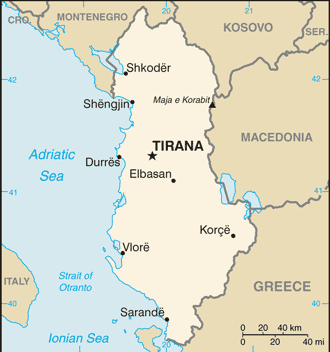 It is now one year since Albania, trying to live down its pariah status as Europe's top cannabis producer, officially declared itself "marijuana-free," after a crackdown undertaken with Italian police aid. But an on-the-scene BBC News report, filed Dec. 1, informs us that the impoverished Balkan country retains the title of the largest producer of outdoor-grown cannabis, at least. Close-up shots of the drying harvest in one village are provided. The crop is described as "green gold" for Albania's struggling farm communities. "In a poor nation, it's a billion-euro industry."
It is now one year since Albania, trying to live down its pariah status as Europe's top cannabis producer, officially declared itself "marijuana-free," after a crackdown undertaken with Italian police aid. But an on-the-scene BBC News report, filed Dec. 1, informs us that the impoverished Balkan country retains the title of the largest producer of outdoor-grown cannabis, at least. Close-up shots of the drying harvest in one village are provided. The crop is described as "green gold" for Albania's struggling farm communities. "In a poor nation, it's a billion-euro industry."
In Albania, a kilo of cannabis sells for between 100 and 200 euros. In Italy that same quantity will fetch some 1,500 euros (street value). The BBC cites estimates the illicit industry may be worth five billion euros per year—about half of Albania's GDP.
"I've produced 350 kilograms," one young (unnamed) farmer told the BBC. "This year almost every single house in the village grew cannabis—tons and tons have been produced in this community alone." He is said to employ 15 people to pick and process, as well as a posse of armed guards to defend his crop. The Beeb ingenuously asks: So if everyone is growing it, and that seems to be common knowledge, why has there been no police raid? The farmer's answer: "I pay the police 20%. Everybody has to pay. If you don't pay they will take you to jail."
The reporter seems to put him on the defensive. He adds: "This is our curse—there are no jobs, no work here. There's no money in growing anything else. I know it's not a good thing I'm doing, but there's no other way."
The government side of the story is also given. "When I took office in 2013, I started to plan huge action against the illegal cultivation of cannabis," said Home Minister Saimir Tahiri. He brought in Italy's Guardia di Finanza to assist in aerial surveillance to identify plantations. "From 2013 to 2016, the figures show more than a 30% decrease in the area of Albania cultivated with cannabis," Tahiri boasted. "That means we're on the right path." But the 30% decrease came about largely because a massive police operation in June 2014 uprooted the formidable crops in Lazarat, a southern village notorious as the cannabis capital of Europe.
But if you compare Italian authorities' figures for 2015 and 2016, they show a five-fold increase in the area cultivated with cannabis. And the BBC adds: "Sources within Albania suggest many communities have turned to drug production for the first time this year."
According to Balkan Insight, the right-wing opposition accuses the Socialist government of Prime Minister Edi Rama of turning a blind eye to the ubiquitous cannabis cultivation in order to keep the farmers happy ahead of next year’s general elections. Ruling party officials strongly deny the claim, of course.
A more sympathetic report from the Balkan Investigative Reporting Network (BIRN) portrays a good-faith effort by Rama's government. In 2014, his first full year in power, the crackdown was inaugurated with the militarized raid on Lazarat. That year, police seized over 100 metric tons—more than the previous nine years combined. Over half a million cannabis plants were destroyed, while the next year that number rose to 800,000. In the first nine months of 2016 police said they had more than doubled the amount of destroyed plants again to 2.1 million.
So the ubiquity of the cannabis economy despite these impressive seize-and-destroy figures only points to how entrenched it really is. And hope for a rational solution? The legalization initiative launched last year by dissident elements within the Socialist Party seems to have gained little traction. A major obstacle is the opposition of the European Union, which has made stepped-up drug enforcement a condition for accession.
Cross-post to High Times
Graphic: Perry-Castañeda Library Map Collection







Recent comments
3 weeks 5 days ago
3 weeks 5 days ago
6 weeks 6 days ago
7 weeks 5 days ago
11 weeks 5 days ago
15 weeks 4 days ago
19 weeks 4 days ago
20 weeks 2 days ago
30 weeks 2 days ago
34 weeks 3 days ago